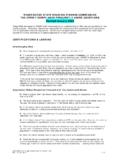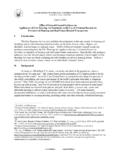Transcription of LANDLORD/TENANT ISSUES FOR SURVIVORS OF …
1 LANDLORD/TENANT ISSUES for SURVIVORS of Domestic Violence, Sexual Assault, and/or Stalking Introduction Tenants who are victims of domestic violence, sexual assault, unlawful harassment or stalking now have increased protection under the Residential landlord tenant Act (RLTA). The RLTA is found in the Revised Code of Washington (RCW ), which can be found at your local library, or online at You ll see citations in this packet. (Example: RCW (1).) Citations will tell you the law that supports the statement that comes before the citation. Use the citation to look up the law at your local law library or online, or to tell the court when you re trying to make a legal argument.
2 RCW stands for Revised Code of Washington, which is the law of Washington State. The law applies only to the rental of residential premises such as an apartment or house, or where both the mobile home and the space are rented in a mobile home park. As of April, 2009, SURVIVORS of domestic violence, sexual assault, unlawful harassment, or stalking can benefit from additional new protections available under the RLTA. A survivor of one of these crimes can now get out of a lease early, and has the right to be free from discrimination by a landlord when entering into or renewing a lease. There are also new protections for a tenant who has been abused, assaulted, or harassed by the landlord , or the landlord s employee.
3 What are domestic violence, sexual assault, unlawful harassment, and stalking? Domestic violence is a pattern of abusive behavior used by someone to control an intimate partner. The abuse can be physical, sexual, verbal, emotional, or psychological. The legal definition of domestic violence is similar. Under Washington state law, domestic violence exists when a person: Hits you, assaults you, or harms you physically in any way, or Causes you to fear immediate physical harm, assault or injury. [RCW (1).] The person causing the harm or threatening you must be A family member and/or Someone you live with or lived with in the past and/or Someone with whom you have or had a dating relationship and/or Someone with whom you have a child.
4 Sexual assault is any unwanted sexual contact, either physical or verbal. (RCW (2); RCW (7).) Unlawful harassment is a pattern of behavior by someone which seriously alarms, annoys, or harasses you. (RCW ) This behavior would: cause you substantial emotional distress; or cause you to fear for your child/ren. (RCW ) 1 A new law passed in 2009 says that unlawful harassment is also when a landlord or property manager asks a tenant for sexual favors in exchange for the performance of the landlord s duties. (RCW (8).) Stalking can be any intentional incident of threatening, harassing, following, surveillance and/or coercive behavior that occurs more than once and causes you to fear for your safety, the safety of someone you know, or your property.
5 RCW ; RCW (1). No one has the right to threaten or hurt you. If you think you may be a victim of domestic violence, sexual assault, and/or stalking, you can find support and resources near you by contacting the Domestic Violence Hotline at 1-800-562-6025. I m a victim of domestic violence, sexual assault, unlawful harassment and/or stalking and I need to move out of the place I rent. Can I end my lease with my landlord and move out without having to pay for the rest of the lease? Under the new law, you and/or your household members (your children or any adults other than the abuser who reside with you) who are SURVIVORS of domestic violence, sexual assault, unlawful harassment and/or stalking may end a lease with your landlord if you meet the following three conditions: 1) You and/or your household members must either have: a valid protection order1 (a court order that may help protect you and your children from 1 The legal term for this court order is order for protection.
6 In this publication, we call it a protection order for short. domestic violence; see our brochure Domestic Violence: How the Legal System Can Help Protect You for information on how to get an order for protection) OR a record of reporting the incident of domestic violence, sexual assault, or stalking to a qualified third party. See Sample Record of Report. A qualified third party means any of the following people: law enforcement officers, state court employees, doctors, nurses and other health care professionals, licensed mental health professionals or counselors, members of the clergy, or crime victim/witness program advocates.
7 (NOTE: While reporting to a qualified third party may help you end your lease, the report doesn t provide you with the legally enforceable safety provisions that a protection order gives you.) 2) You must notify your landlord in writing that you (and/or your household member) are a victim of domestic violence, sexual assault, unlawful harassment, and/or stalking and attach a copy of the valid protection order or the record of the report to a qualified third party to your letter. See Sample Letter #1 or #2. If you re attaching a Record of Report form, make sure that the qualified third party you reported to has a copy of the form that includes your abuser s name (Page 1 of the Record of Report Form).
8 The copy you provide to the landlord (Page 2 of the Record of Report Form) doesn t have to include the 2 name of the abuser, unless you feel comfortable giving this information to your landlord . 3) The last thing you must do is notify your landlord that you ll be moving out within 90 days of the incident of domestic violence, sexual assault, or stalking that caused you to seek the protection order or make the report. You can do this in the same letter that you use in step 2. See Sample Letter #1 or #2. Remember: this is NOT 90 days from the day you reported the incident or received the order for protection.
9 It s 90 days from the date the incident occurred. If these three conditions are met, you may end your lease and move out without having to pay for the rest of the time on your lease. You ll still have to pay the rent due for the month in which you leave (even if you leave in the middle of the month), but you ll be entitled to a refund of your deposit. To make sure you get your deposit back, see our publication Recovering Your Security Deposit which explains how to get your deposit back and what to do if you don t. What if it s my landlord who has assaulted, stalked, or harassed me? If you re a victim of sexual assault, stalking, or harassment by your landlord , you can end your lease early and move out without having to pay for the rest of the lease if you do the following: 1.
10 You or your household member must get a protection order or make out a report to a qualified 3rd party against the landlord (explained above) AND 2. you must deliver a copy of your protection order or Record of Report to the landlord within 7 days of moving out. You use mail, fax, or personal delivery by a friend or relative. The copy you provide to the landlord (Page 2 of the Record of Report Form) must not include the name of the abuser. RCW (3)(a)(ii). However, if the landlord asks for the abuser s name, and the abuser was the landlord s employee, the 3rd party you made the report to must give the landlord the abuser s name.







